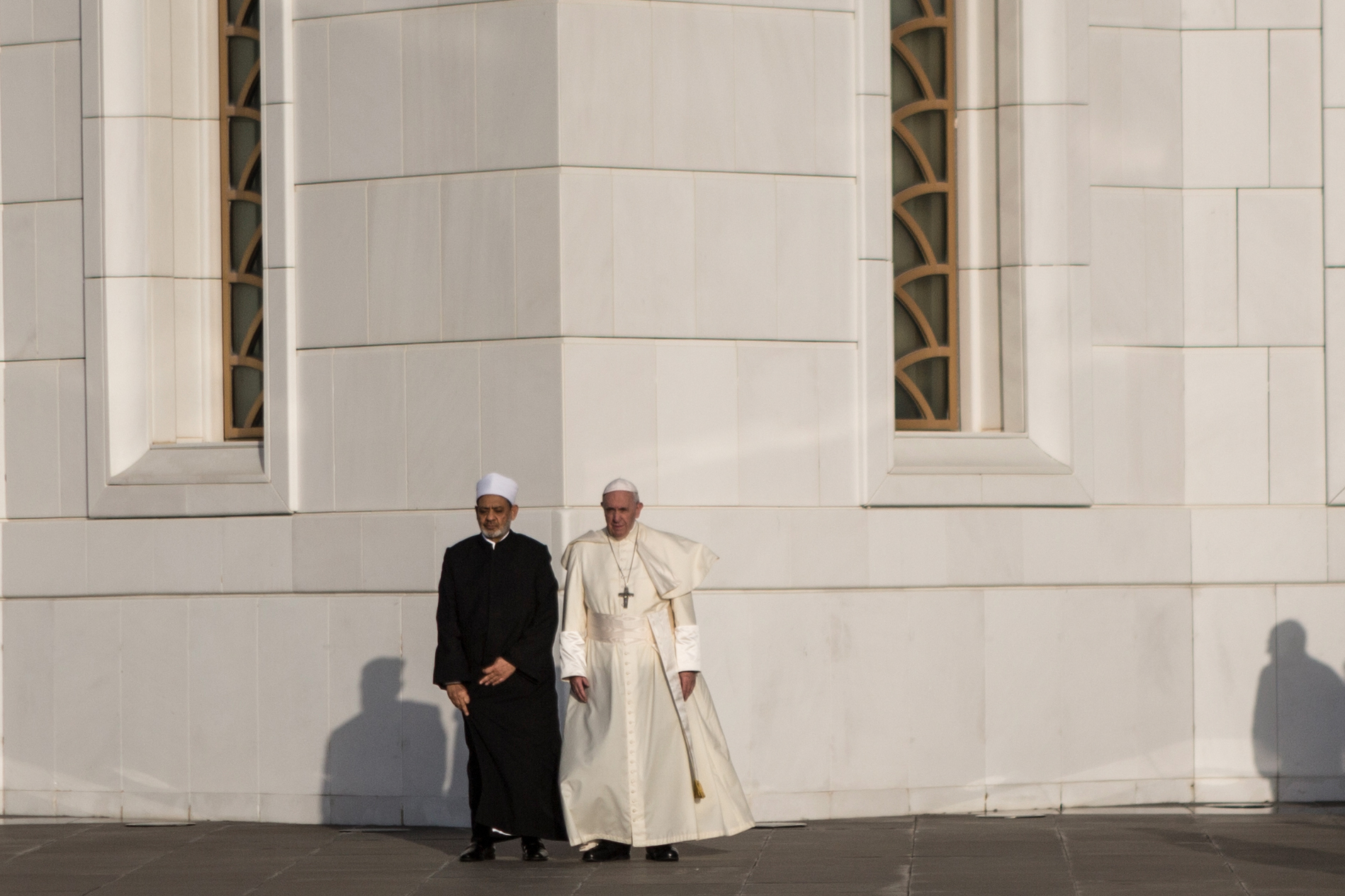On Tuesday in Abu Dhabi the Grand Imam of Al-Azhar in Egypt and Pope Francis signed a document that could place Christian-Muslim relations on a new and firmer foundation than they have ever been on before.
Ever since his election in 2013 Pope Francis has promoted “dialogue” as the only valid way of interacting with Islam, but until now it was difficult to see where this dialogue was heading. Many observers, myself included, felt that there was a danger that this was a dialogue of the deaf. Christians could demand – or request – a reciprocal respect for Christians in Muslim countries that Muslims enjoyed in western, once Christian, democracies. But horrific terror attacks in the name of Islamic State, continuing persecution of Christians in Iraq and elsewhere, and the injustices perpetrated on Christians under Pakistan’s blasphemy laws, all served to make me feel that this approach was naïve, to say the least.
But the document signed by the foremost Sunni leader, Ahmed al-Tayyeb, and Pope Francis, could represent – to use a phrase sometimes associated with the Pope’s 2016 apostolic exhortation on the family Amoris Laetitia - a paradigm shift in interfaith relations. It may also indicate that there are important and brave movers among the movers and shakers in Islam willing to establish the faith more comfortably in the context of an international environment based on mutual respect across cultures, and the faiths that inform them. The obligation of domination has been abandoned, at least on the part of key voices in Sunni Islam, whose 1.8 billion adherents represent 24 per cent of the world’s population. The document “Human Fraternity: For World Peace and Living Together” makes bold undertakings on the part of both signatories for different reasons, with Pope Francis putting his name to a stout defence of Christianity in the Muslim world, and Dr Al-Tayyeb risking the wrath of those Muslims who think the only place for Christians in Muslim countries is as second class citizens, if they should be granted citizenship at all.
Speaking in the name of freedom, "that God has given to all human beings creating them free and distinguishing them by this gift", the two faith leaders pledge to intervene to halt “the moral and cultural decline that the world is presently experiencing”. They go on: “We call upon intellectuals, philosophers, religious figures, artists, media professionals and men and women of culture in every part of the world, to rediscover the values of peace, justice, goodness, beauty, human fraternity and coexistence in order to confirm the importance of these values as anchors of salvation for all, and to promote them everywhere.”
They set out together, "from a profound consideration of our contemporary reality”. They distance themselves from “a prevailing individualism accompanied by materialistic philosophies that deify the human person and introduce worldly and material values in place of supreme and transcendental principles”. Good for them. In the face of “catastrophic” crises that result in the deaths of millions of children – wasted away from poverty and hunger – there is an unacceptable silence on the international level, the Pope and the Imam continue, going on to affirm that “It is clear in this context how the family as the fundamental nucleus of society and humanity is essential in bringing children into the world, raising them, educating them, and providing them with solid moral formation and domestic security. To attack the institution of the family, to regard it with contempt or to doubt its important role, is one of the most threatening evils of our era.”
And so say all of us, every Catholic and every Christian should reply. And there is much more. “We condemn all those practices that are a threat to life, such as genocide, acts of terrorism, forced displacement, human trafficking, abortion and euthanasia. We likewise condemn the policies that promote these practices.” Anyone have a problem with that?
The two leaders continue: “We thus call upon all concerned to stop using religions to incite hatred, violence, extremism and blind fanaticism, and to refrain from using the name of God to justify acts of murder, exile, terrorism and oppression. We ask this on the basis of our common belief in God who did not create men and women to be killed or to fight one another, nor to be tortured or humiliated in their lives and circumstances. God, the Almighty, has no need to be defended by anyone and does not want His name to be used to terrorise people.” Proponents of Wahhabi Islam will be frothing at the mouth at this point – and if this document means that those people are now on the back foot, then not only Muslims but the whole world should be rejoicing.
Francis will not, of course, have things all his own way either, and there are certainly some Catholics and other Christians who will not like the next undertaking he signed up to: “The pluralism and the diversity of religions, colour, sex, race and language are willed by God in His wisdom, through which He created human beings. This divine wisdom is the source from which the right to freedom of belief and the freedom to be different derives.” This will be, to say the least, controversial among some Christians. In the New Testament, Christ tells his followers to “make disciples of all nations” (Matthew 28:19), a teaching that seems to come directly up against the Muslim teaching that forbids apostasy. Others will argue that, if a culture of encounter and respect is facilitated, then the door is opened for God to offer the gift of faith to whoever he chooses.
There's more. Francis explained to journalists on his flight home from Abu Dhabi that there was not “one millimetre” between the teaching of the joint declaration and of the Second Vatican Council, which recognised that the Jewish people were our “elder brothers” in the faith. But the the insistence by the Pope and the Grand Imam that “the protection of places of worship – synagogues [yes, synagogues], churches and mosques – is a duty guaranteed by religions, human values, laws and international agreements” was nonetheless remarkable. I do not anticipate a return of Jews to Muslim lands just yet, but nothing is impossible with God.
Moreover, the leaders say, the “discriminatory use of the term ‘minorities’, which engenders feelings of isolation and inferiority”, must be rejected in the name of “the concept of full citizenship”. Fraternity across boundaries, most notably those much-storied boundaries between East and West, can be mutually enriching. “The West can discover in the East remedies for those spiritual and religious maladies that are caused by a prevailing materialism. And the East can find in the West many elements that can help free it from weakness, division, conflict and scientific, technical and cultural decline.”
Finally, the leaders address head on probably the most contested issue in any discussion of human rights in the Muslim world, the status of women: “It is an essential requirement to recognise the right of women to education and employment, and to recognise their freedom to exercise their own political rights. Moreover, efforts must be made to free women from historical and social conditioning that runs contrary to the principles of their faith and dignity. It is also necessary to protect women from sexual exploitation and from being treated as merchandise or objects of pleasure or financial gain. Accordingly, an end must be brought to all those inhuman and vulgar practices that denigrate the dignity of women. Efforts must be made to modify those laws that prevent women from fully enjoying their rights.”
As they would say on Twitter, “Wow”. Then the affirmation of the right of children to “grow up in a family environment, to receive nutrition, education and support” is repeated, and “the protection of the rights of the elderly, the weak, the disabled, and the oppressed is a religious and social obligation that must be guaranteed and defended through strict legislation and the implementation of the relevant international agreements”.
The Catholic Church and Al-Azhar pledge “to convey this Document to authorities, influential leaders, persons of religion all over the world” – including making it “the object of research and reflection in all schools, universities and institutes of formation”.
“This is what we hope and seek to achieve with the aim of finding a universal peace that all can enjoy in this life,” Pope Francis and Ahmed al-Tayyeb conclude, risking the knowing mockery of those made rich and comfortable by a lifetime of cynicism. Speaking as someone who confesses that he has found both signatories less than persuasive on occasion, I would say to those cynics: “For once, get out of your comfort zone, take a closer look at what has been achieved here, and – go on – try fraternity. It may surprise you.”



 Loading ...
Loading ...
What do you think?
You can post as a subscriber user ...
User comments (0)